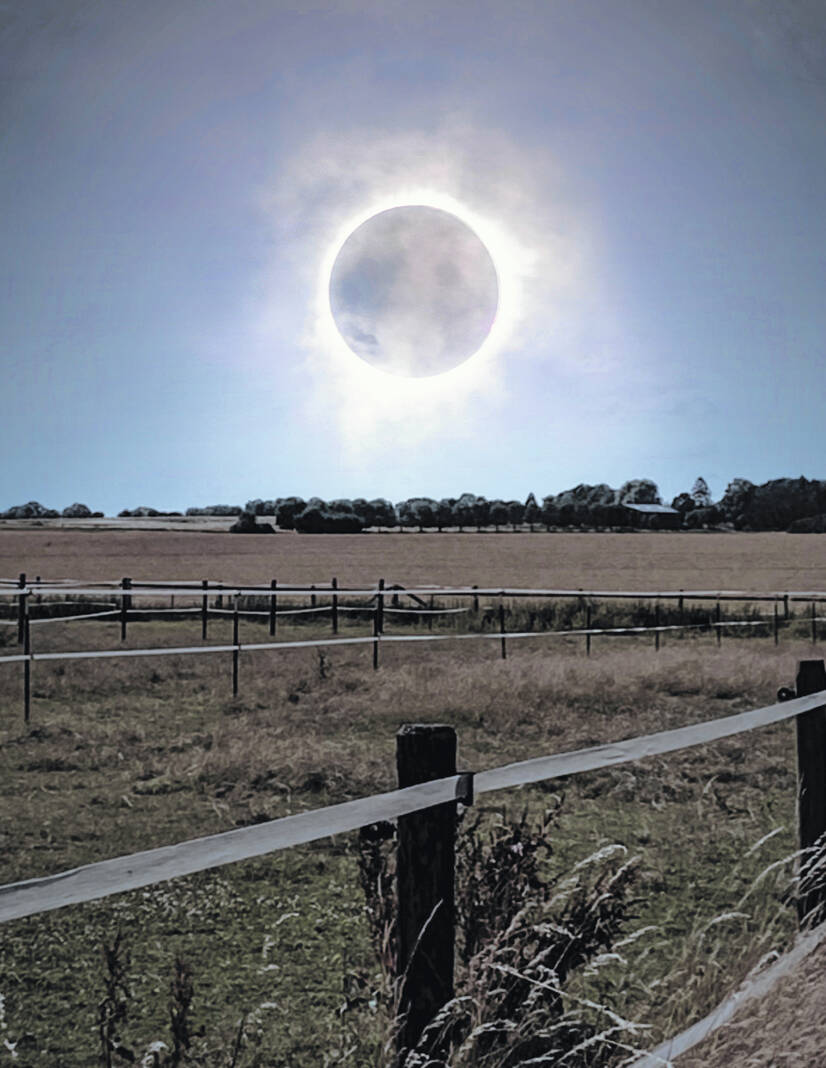
Many eclipse chasers are keeping their eyes on the weather as they decide where they are going to head to watch the upcoming Great American Eclipse. This could mean a larger influx of visitors looking for open land to park on and view the total solar eclipse on Monday, April 8. Farmland could be a prime spot — if farmers want to invite visitors to their property. If they don’t there are steps to take to protect a property.
Submitted | Preble County CVB stock photo
PREBLE COUNTY – Being in the path of totality for the Monday, April 8, total eclipse is an exciting place to be for eclipse watchers, especially for those of us who live in an area where we can watch without traveling too far from home.
Many eclipse chasers are keeping their eyes on the weather as they decide where they are going to head to watch the upcoming Great American Eclipse. And right now, it’s difficult to make that decision because we all know how the weather – and forecasts go here in Ohio. If you check out the Weather Channel at press time, you’re going to be disheartened because it’s giving showers and clouds. Check out Accuweather, and it’s forecasting 67 degrees and mostly sunny for eclipse day in Eaton! (Fingers crossed Accuweather wins this one!)
The predicted influx of visitors coming into the path of totality could find people looking for places to park and view the once-in-a-lifetime event.
Are you a farmland owner in Preble County, wondering whether or not you should invite solar eclipse viewers on to your property for the Monday, April 8, total solar eclipse?
A recent blog post, “Preparing farms for the solar eclipse,” from Peggy Kirk Hall, Director of the Ohio State University Agricultural & Resource Law Program and Wayne Dellinger, Extension Educator and OSU Ag Safety Team Member, can be found online at https://farmoffice.osu.edu/solar-eclipse-2024. It offers lots of important information and resources regarding safety and legal matters.
They note, “Up to a half-million people could flow into the solar eclipse path that will cross Ohio on April 8. The potential increase of visitors to Ohio’s rural areas raises unique safety and legal concerns for farmers and farmland owners. To prepare for potential impacts of the eclipse on the agricultural community, OSU’s Agricultural & Resource Law Program and OSU’s Ag Safety Team offer these five steps farmers and farmland owners can take:
•1. Secure the farm property.
•2. Understand trespass laws.
•3. Know responsibilities for invited guests.
•4. Plan ahead for farming activities.
•5. Be prepared to react to an incident.”
The piece is long and goes on to explain each step. We’ll let you go online and read most of it yourself. But we do want to share more about Hall and Dellinger’s first step: securing the farm property, for our residents who want to ensure wandering eclipse watchers don’t invite themselves on their land and cause issues.
“Farm and farmstead security has been the topic of many discussions as it relates to the upcoming solar eclipse,” the post notes. “Depending on traffic congestion and proximity of fields, barn lots, and homesteads, visiting motorists may just pull off the road wherever they are at the time the eclipse begins. This could lead to the wandering around of uninvited guests both young and old. Farmers and farmland owners can take several steps to secure the property and prevent access.”
Actions to take, according to Hall and Dellinger include:
•“First, walk around the farm with someone who has a fresh set of eyes, such as a relative, a neighbor, or a non-farm friend. Have them help identify potential dangers that would appear open, interesting, or attractive to an uninvited guest on the farm. This can be helpful, as we become desensitized to dangers that we see daily and we tend to overlook them.”
•“Take inventory of all equipment and equipment locations prior to April 8. Remove keys and lock cabs for all equipment in a non-secured building, if possible, or if not possible, remove battery cables off batteries or install a battery disconnect switch.”
•“Special care should be taken with anhydrous ammonia tanks. Do not leave nurse tanks sitting in fields and remove hoses when not in use.”
•“Lock all shops and storage buildings, especially areas where pesticides are stored.”
•“Secure all ladders to grain bins, silos, hay lofts, etc.”
•“Restrict entry to drives, pits, and lagoons with gates and barricades.”
•“Livestock operations should not have high biosecurity concerns since eclipse viewers are likely to be ‘low risk visitors’ who do not interact with other livestock facilities. But to avoid biosecurity concerns and reduce the risk of introductions of new diseases, keep livestock inside and keep barns and gates locked.”
•“Post ‘No Trespassing’ signs at all points of entry to barn yards and fields.”
•“Finally, an added measure to help you in case of an incident or claim is to document what you’ve done by taking notes, pictures and/or videos of all areas you’ve secured.”
Visit at https://farmoffice.osu.edu/solar-eclipse-2024 for more information on Hall and Dellinger’s other tips.
For more information on events and activities scheduled across Preble County related to the total solar eclipse on April 8, visit https://www.visitpreblecounty.org/2024-solar-eclipse/.

